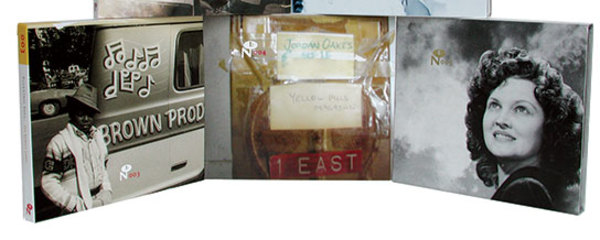Numero Group: Going Off the Deep End
“We take most of our meetings here during the summer, around 10 or 11 feet,” […]
Numero Group: Going Off the Deep End
“We take most of our meetings here during the summer, around 10 or 11 feet,” […]

“We take most of our meetings here during the summer, around 10 or 11 feet,” says Ken Shipley of Chicago Park District’s Olympic-sized pride and joy–Holstein Pool. “We just hang on the side during lap swims. If they had a wireless connection here, we’d be here all the time. We tried once to log on, but there is no signal down here.”
Shipley is a founding third of reissues label Numero Group, and this pool is where much of the creative thunder has rumbled “The sequencing meetings for the Capsoul release were here,” he remembers, almost wistfully. “We were humming the songs, trying to figure out the order.”
Shipley and partners Rob Sevier and Tom Lunt have quickly turned Numero from a curious boutique outfit into a reissue zeitgeist–garnering raves from casual fans to collectors, from NPR to national mags. Numero brings the forgotten to the fore with lovingly packaged CD collections of artists known only to deep-crate diggers or those who were around “back in the day.” “We started [by] putting together stacks of 45s, sorting ’em by label and talking about how we were going to find these people,” says Shipley. Their first choice was Ohio’s long-defunct sweet soul label, Capsoul. “In the summer of 2003, we went to Columbus, Ohio and talked to (Capsoul founder) Bill Moss,” says Shipley. “He gave us the go, and we’ve been running with it ever since.”
In the last two years, Numero has amassed an impressive and eclectic catalog, spanning from Factory Records also-rans Antena (an all-female French electro-samba band) to reissues from Chicago funk label Bandit to the country gospel of Fern Jones, who was the Patsy Cline of the southern revival tent circuit.
While those releases put them on the map, the next few are positively nuclear. First up is a primer on Belizean funk, where calypso and James Brown meet the hurricane-inflicted diaspora. Then comes a 100-plus track Deep City boxset, chronicling the Miami label, famously helmed by Clarence Reed and Willy Clark, from 1964-68. “The Deep City box started how all of our projects do,” explains Shipley. “You finally get your hands on this amazing single, and then think, ‘There has got to be more where this came from.’ Then you find some discography, and that leads you to this wealth of people. And then, suddenly, you wind up with never-heard-before acetates dug up from Willy Clark’s wife’s closet.”

